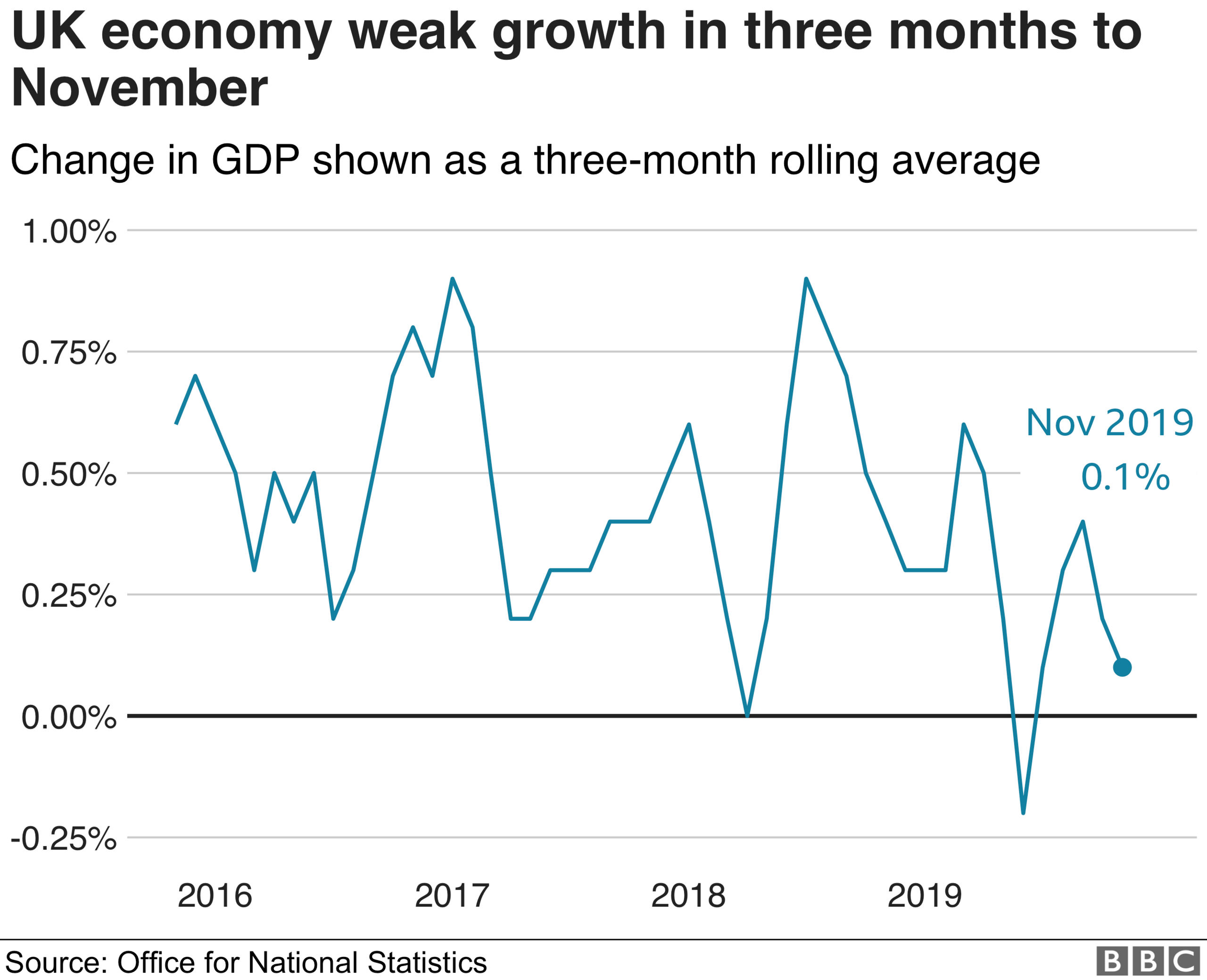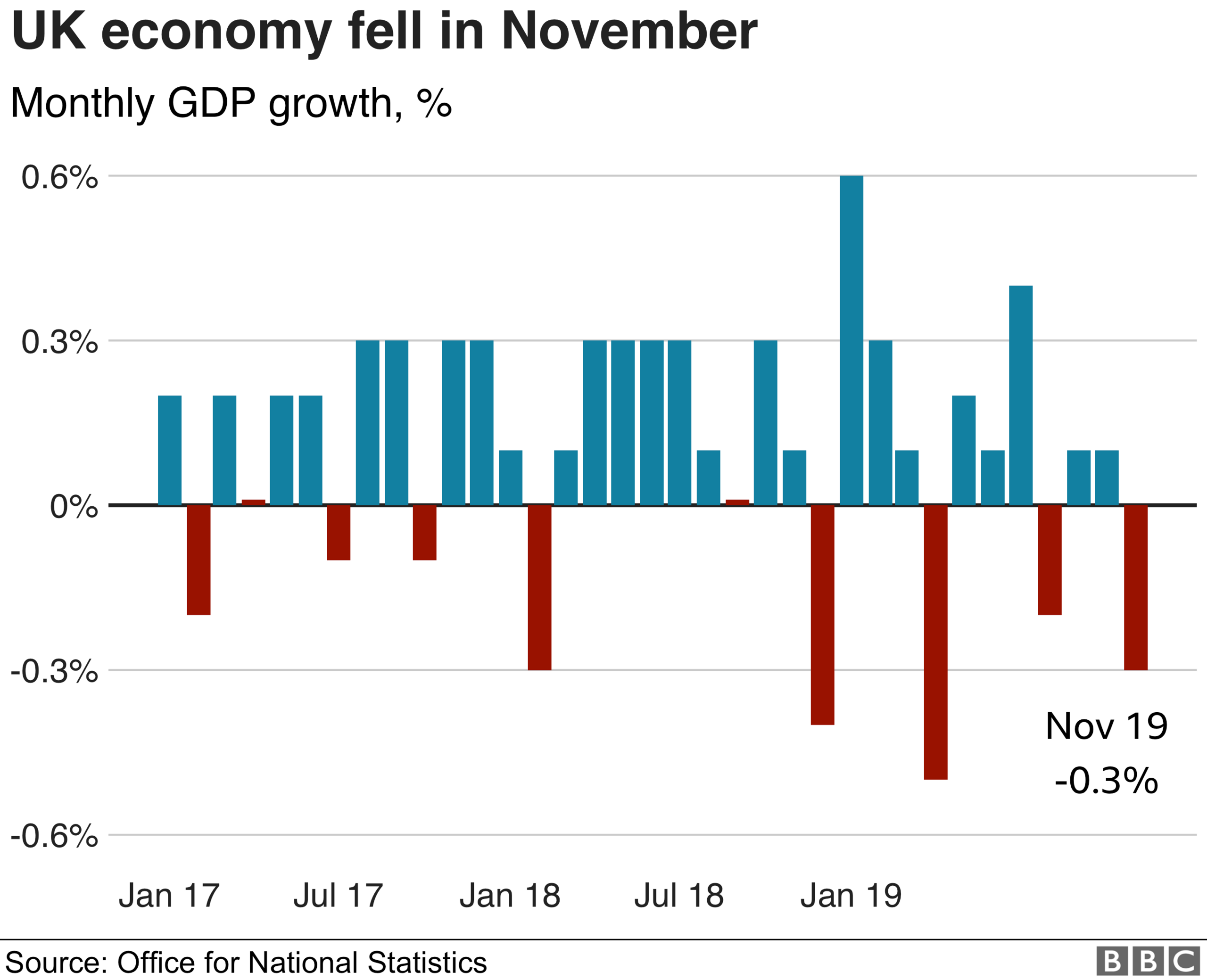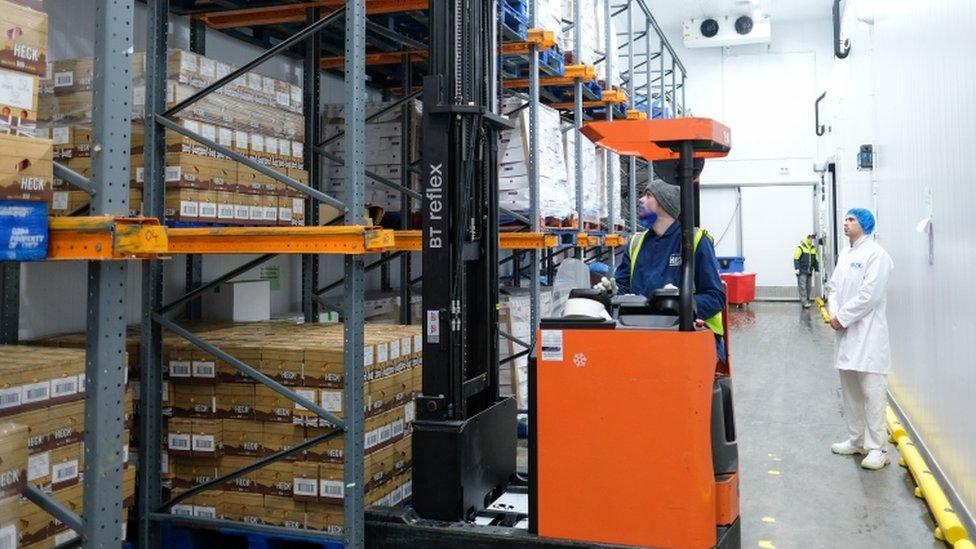Weak November weighs on UK growth
- Published
- comments

The UK's economy grew by just 0.1% in the three months to November, according to the Office for National Statistics.
Growth was slightly stronger in September and October than previously thought, but fell 0.3% in November, dragging down the three-month figure.
The ONS said growth in the economy year-on-year was at its lowest since the spring of 2012.
Growth in construction was offset by a weakening service sector, while manufacturing was "lacklustre".
The figures come amid growing speculation that the Bank of England's Monetary Policy Committee (MPC) may be preparing to cut interest rates sooner rather than later.
The pound dropped 0.6% in early trading on Monday after one of the Bank's policymakers, Gertjan Vlieghe, said he would vote for an interest rate cut this month unless economic data showed good progress for the UK.
What happened in the three-month period?
The figure of 0.1% growth was better than expected, said analysts.

ONS head of GDP Rob Kent-Smith said: "Overall, the economy grew slightly in the latest three months, with growth in construction pulled back by weakening services and another lacklustre performance from manufacturing.
"The UK economy grew slightly more strongly in September and October than was previously estimated, with later data painting a healthier picture."
The revised ONS figures now show growth of 0.1% in each of those two months.
What happened in November?
In the month of November, GDP fell by 0.3%, which was worse than expected.
The ONS said the November decline was driven by falls in both services and production.

"In the month of November, growth in services was -0.3%, following an upwardly revised growth of 0.3% in October 2019," it added.
"Small increases across a small number of industries were more than offset by relatively large falls in several other industries, most notably scientific research and development, and wholesale trade, which each took 0.07 percentage points off monthly gross domestic product (GDP) growth."

What other economic data came out on Monday?
In other ONS releases, the UK's trade deficit widened by £9.1bn to £36bn in the 12 months to November 2019, mainly because of the trade in goods deficit, which increased by £7.4bn to £143.9bn.
The trade in services surplus narrowed £1.7bn to £107.9bn in the same period.
What are commentators saying?
"Today's data confirmed that the UK economy remained in the doldrums last autumn," said John Hawksworth, chief economist at PwC.
"All of this data, however, relates to a period of heightened economic and political uncertainty last autumn due to Brexit and the general election.
"It is too early to say for sure if economic momentum will pick up in the new year now the political situation is clearer, but our latest survey of the financial services sector with the CBI does suggest some boost to optimism since the election."
Samuel Tombs, chief UK economist at Pantheon Macroeconomics, said: "The latest GDP data are nowhere near as horrendous as they appear initially. The sharp fall in November has followed upwardly revised growth in the previous two months.
"In addition, nearly all of November's fall in GDP was attributable to temporary weakness in the manufacturing and distribution sectors."
And what about the political reaction?
Chancellor Sajid Javid said: "Uncertainty has held our economy back for too long. We are getting Brexit done so we can move on and chart a new course for our economy.
"In my Budget on 11 March, we will lay the foundations for a decade of renewal that will unleash Britain's potential by levelling up across our great country."
Shadow chancellor John McDonnell said: "After a decade of decay in our public services, this is yet more evidence that weak growth is continuing under the Tories.
"Our production sector and manufacturing growth are suffering as a result of ongoing Tory mismanagement and incompetence.
"Labour will continue to hold the government to account for its disastrous economic record and fight for the investment that is needed to restore public services and tackle the climate emergency."


However you look on the latest economic numbers, they aren't strong. You can be certain they're weak - economic growth of 0.1% in the three months from the start of September to the end of November is no-one's idea of a stellar economic performance.
And on the less certain but more recent one-month figures, they're worrying. These initial estimates (often later revised) suggest the economy shrank by 0.3% in November. Manufacturing was down 1.7% and services also fell, by 0.43%. If you compare November with a year before, growth was just 0.6%.
Set against these figures - which hark back to a long-forgotten time before the general election - are more recent numbers showing business confidence increasing since the election. Political uncertainty held the economy back, so the story goes, and now that's behind us, there will be no stopping us.
However, optimism is one thing: to rekindle the business investment that has been so sorely lacking in recent months (and years) there also needs to be much greater certainty, not just about who is in government, but about trade arrangements with our biggest trading partner and the rest of the world.

- Published12 January 2020

